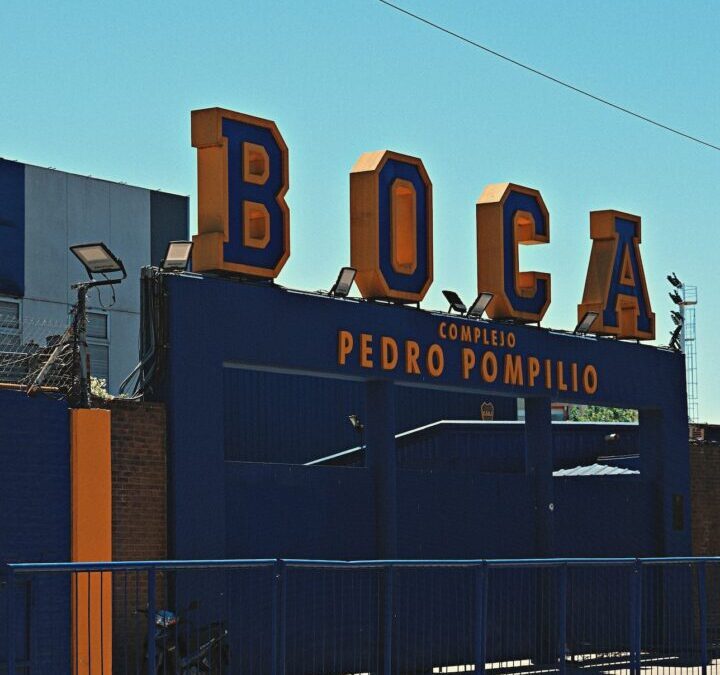Fußball ist überall – in den Straßen von Neapel, auf den Tribünen in Lima, in den Augen eines Fans, der im Regen jubelt. Doch nur wenige schaffen es, diese Momente so einzufangen wie Christian Brown, Gründer von The Atlantic Dispatch.
Das britische Online-Magazin erzählt Fußballgeschichten, die weit über den Platz hinausgehen – über Kultur, Identität und die Menschen, die diesen Sport zu dem machen, was er ist.
Im Gespräch spricht Chris über seine Liebe zu Ästhetik und Storytelling, über Brasilien als Fußballreligion, Sampdoria als Kindheitstraum – und darüber, warum Fußball für ihn längst mehr ist als ein Spiel.
Holt euch noch schnell ein Getränk eurer Wahl und viel Spaß mit Chris und The Atlantic Dispatch!
Das Interview ist in deutscher und englischer Sprache veröffentlicht.
Please scroll down for the English version.
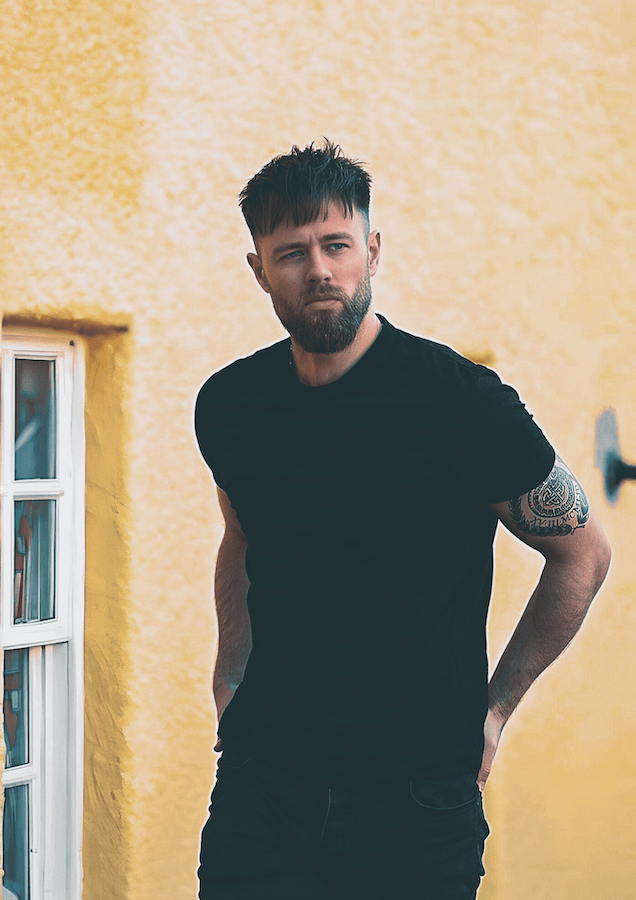
„Fußball ist eine Linse, durch die man das Leben sieht“
Chris, bevor wir loslegen: Stell dich doch bitte kurz unserer Community vor. Wie ist The Atlantic Dispatch entstanden? War das eine spontane Idee, ein Zufall – oder eher eine Reaktion auf etwas, das dir im Fußballjournalismus gefehlt hat?
Die Idee kam während des Lockdowns. Ich glaube, viele haben in dieser Zeit angefangen, ihr Leben neu zu bewerten – zu hinterfragen, was ihnen wirklich wichtig ist und ob sie das tun, was sie lieben.
Ich war zu diesem Zeitpunkt ziemlich ernüchtert vom Medienbetrieb. Alles drehte sich um Klickzahlen, Werbung oder Negativität. Also dachte ich: Warum nicht etwas schaffen, das mir wirklich am Herzen liegt?
The Atlantic Dispatch sollte ein Ort werden, an dem echte Fußballgeschichten erzählt werden – mit Blick auf Reisen, Kultur und die Menschen dahinter. Eine Plattform, die Fans kleinerer Klubs eine Stimme gibt und zugleich zeigt, was unabhängige Kreative überall auf der Welt leisten.
Gab es einen Moment, in dem dir klar wurde: Genau deswegen gibt es The Atlantic Dispatch?
Wenn ich Nachrichten bekomme von Menschen, die sich bedanken, weil wir ihre Stadt oder ihren Verein porträtiert haben – das bedeutet mir enorm viel.
Oder wenn jemand, den wir interviewt haben, schreibt, wie sehr ihn das Stück berührt hat. Das sind die Momente, in denen ich weiß, dass es das alles wert ist.
Es gibt so viele unfassbar talentierte Menschen da draußen. Mit ihnen zusammenzuarbeiten oder ihre Geschichten erzählen zu dürfen, ist einfach großartig.
Wenn dich jemand fragt, was The Atlantic Dispatch eigentlich ist – wie erklärst du es in einem Satz?
Ich würde sagen: The Atlantic Dispatch ist eine Erzählplattform, die Fußball als Linse nutzt, um Kultur, Identität und das Menschsein zu erforschen.
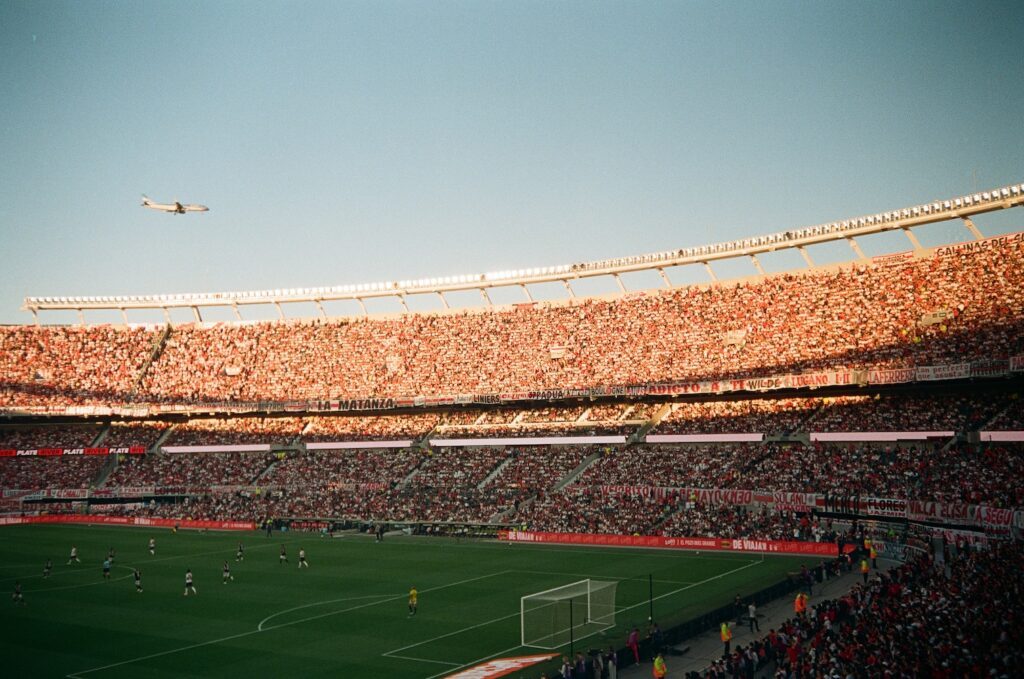
Siehst du dich eher als Journalist, Geschichtenerzähler, Kurator – oder als Reisender durch die Fußballwelt?
Ich könnte mich niemals mit den großen Journalistinnen, Schreibern oder Kuratoren dieser Welt vergleichen. Ich bin einfach jemand, der liebt, Geschichten über außergewöhnliche Menschen zu erzählen – und zu hoffen, ihnen damit gerecht zu werden.
Eure visuelle Sprache – Fotos, Design, Texturen – hat einen ganz eigenen Stil. Wie wichtig ist dir diese Ästhetik?
Sehr wichtig. Ich liebe Schreiben, Fotografie, Design – und die Ästhetik vergangener Jahrzehnte.
Mir ist wichtig, dass man sieht, dass in allem Sorgfalt steckt. Dass Zeit und Liebe hineingeflossen sind. Für mich zählt das mehr als jedem Trend hinterherzulaufen.
Was macht für dich ein großartiges Fußballfoto aus – eines, das mehr erzählt als ein Torjubel?
Ich liebe Fotos, die die Leidenschaft der Fans einfangen. Dieser Moment, wenn man das Gesicht eines Fans sieht, während sein Team trifft – unbezahlbar.
Das ist es, was ich am Fußball liebe: die Emotion, die er hervorruft. Fußball ist Kunst – wie Kino oder Musik. Er lässt dich Dinge fühlen, von denen du nicht wusstest, dass du sie fühlen kannst. Für viele ist er fast eine Religion – etwas, das sie auf eine höhere Ebene hebt.
Wenn The Atlantic Dispatch ein Fußballklub wäre – wie sähe euer Wappen aus?
Das wäre tatsächlich ein Traum! Der Name ist inspiriert von den Entdeckern und Schriftstellern vergangener Zeiten, die über die Meere segelten und ihre Berichte in die Welt trugen.
Unser Logo müsste ein altes Schiff zeigen – in einem Blauton, der sowohl das Meer als auch den Himmel widerspiegelt.
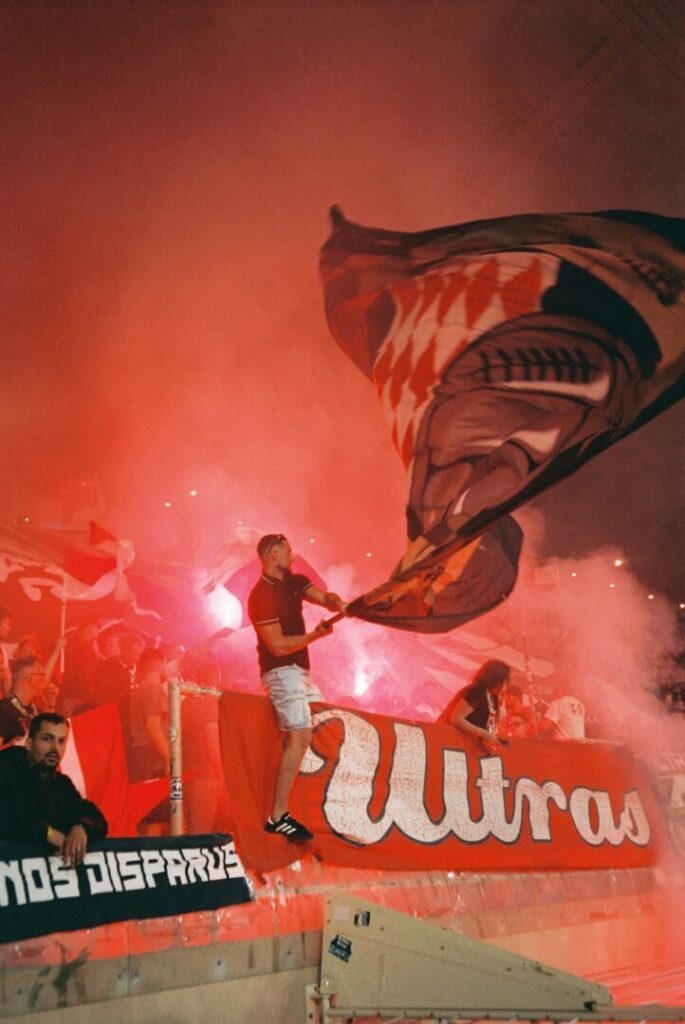
Wer oder was ist The Atlantic Dispatch heute – ein festes Team, ein loses Kollektiv oder einfach ein Gefühl, das Menschen weltweit verbindet?
Anfangs lautete unser Motto „The Society of Wireless Correspondents“. Die Idee war, mit möglichst vielen kreativen Menschen weltweit zusammenzuarbeiten – und daraus eine Gemeinschaft entstehen zu lassen.
Dass das tatsächlich funktioniert hat, ist ein ziemlich besonderes Gefühl.
Ihr arbeitet mit Autor:innen und Fotograf:innen auf mehreren Kontinenten. Wie läuft diese Zusammenarbeit ab?
Oft beginnt alles mit Neugier. Wir stoßen auf eine Geschichte, reisen hin und erleben sie selbst – oder jemand aus unserer Community schreibt uns mit einer Idee, die einen besonderen Blick auf seine Heimat eröffnet.
Wir haben das Glück, ein Netzwerk von kreativen Köpfen auf der ganzen Welt zu haben, die dieselbe Leidenschaft teilen.
Manchmal entwickeln wir eine Geschichte gemeinsam – sie bringen den lokalen Blick ein, wir die redaktionelle Vision. So entsteht etwas, das sich nach Atlantic Dispatch anfühlt. Und dabei sind echte Freundschaften entstanden. Diese Gemeinschaft ist das Herzstück von allem.
Ihr wollt Kulturen verbinden – durch Geschichten, Bilder und Stimmen. Wie vermeidet ihr dabei Klischees oder bloße Exotik?
Indem wir Menschen selbst zu Wort kommen lassen. Wenn wir mit Leuten aus Buenos Aires, Neapel oder São Paulo sprechen, dann erzählen sie ihre Geschichte – nicht wir.
Mir geht’s um Authentizität, nicht um Stereotype. Sensationalismus und Clickbait sind mir zuwider. Das wäre respektlos gegenüber denen, die uns ihre Zeit schenken – und gegenüber den Leser:innen.
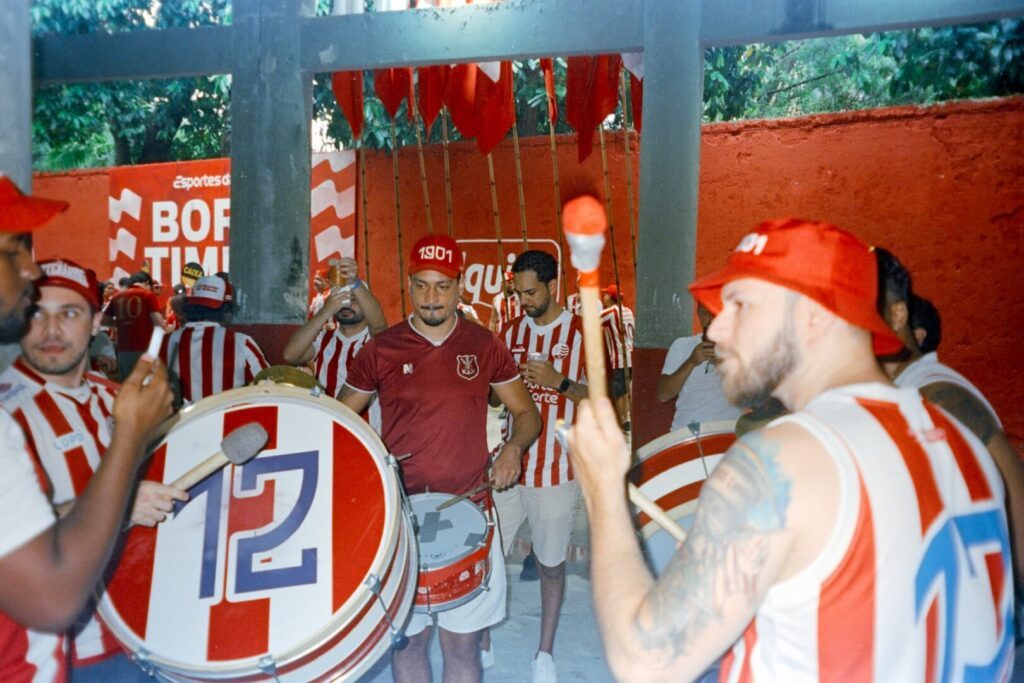
Du reist viel und erlebst Fußball in ganz unterschiedlichen kulturellen Kontexten. Gibt es ein Land oder eine Stadt, die dich besonders bewegt hat?
Das Schöne am Fußball ist: Egal, wohin man reist – er bringt Menschen zusammen. Ich habe das unzählige Male erlebt.
Aber Brasilien ist besonders. Ich habe nie ein Land gesehen, das so leidenschaftlich ist. Als wir begannen, mehr Inhalte über südamerikanischen Fußball zu machen, schrieben uns Menschen aus ganz Brasilien – wollten, dass wir ihren Klub vorstellen. Das war überwältigend.
Dort ist Fußball tatsächlich Religion. Und das spürt man überall.
Wenn du in der Zeit zurückreisen könntest – zu welchem Turnier würdest du gehen? Und würdest du lieber eine Kamera oder ein Notizbuch mitnehmen?
Mein Vater hat mir als Kind ein Video über das brasilianische Team von 1970 geschenkt. Ich hab’s rauf und runter geschaut. Später kam Hero über die WM ’86 in Mexiko – erzählt von Michael Caine. Ich war völlig hypnotisiert: die Farben, der Lärm, die Spieler.
Wenn ich eines dieser Turniere live hätte erleben können, hätte ich eine Super 8 mitgenommen und alles festgehalten.
Diese Filme haben mich in den Fußball verliebt gemacht. Dann kam Italien ’90 – meine erste WM. Ich war sechs und völlig geflasht: die Trikots, die Stadien, die Spieler. Ich rannte im Garten herum und tat so, als wäre ich Toto Schillaci.
Auch die USA ’94 war magisch. Wenn man heute die Aufnahmen sieht – alles wirkt einfach schöner. Ich hätte all das zu gern mit eigenen Augen gesehen.
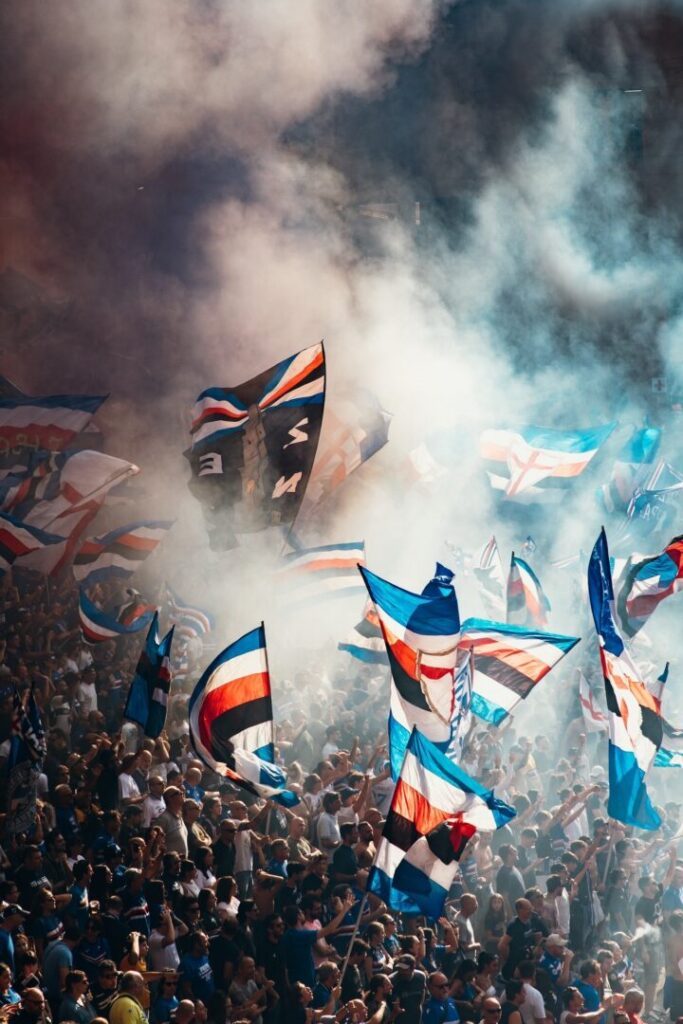
Gibt es ein Stadion, das du unbedingt einmal besuchen wolltest?
Ja, das Luigi Ferraris in Genua. Ich war als Kind verrückt nach Sampdoria. Jeden Sonntag lief Football Italia im britischen Fernsehen, und ich war hin und weg.
Als ich dann endlich selbst dort war – unbeschreiblich. Ein Kindheitstraum.
Ein anderes Erlebnis war das Olympiastadion in München – Bayern gegen Rangers in der Champions League. Wunderschön.
Es ist schade, dass so viele Vereine ihre alten Stadien verlassen. Wenn das San Siro irgendwann verschwindet, wird das ein trauriger Tag für den Fußball.
Ihr habt mit Fiorentina, Legia Warschau, AS Monaco und Visit Naples gearbeitet. Was reizt dich an solchen Projekten?
Mit Fiorentina zu arbeiten war etwas ganz Besonderes – eines meiner ersten Trikots als Kind war ihres.
Bei Legia Warschau beeindruckt mich die Leidenschaft der Menschen. In Monaco wollte ich zeigen, dass auch dort echte Fußballkultur existiert, fernab von Klischees.
Und das Projekt mit Visit Naples hat uns die Stadt auf eine neue Weise nähergebracht – durch die Geschichten der Menschen, die dort leben.
Diese Vielfalt zu erleben ist ein Geschenk. Jede dieser Begegnungen war eine Lektion.
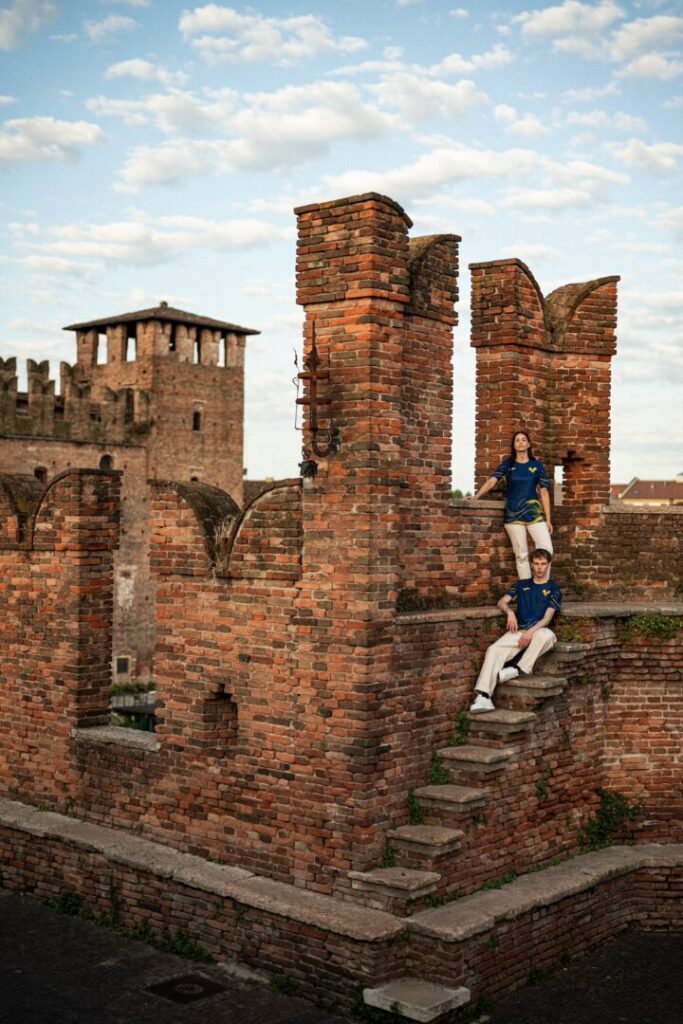
Was steht als Nächstes an?
Wir feiern bald das 125-jährige Jubiläum des Palermo FC. Dafür reisen wir nach Sizilien, um dort spannende Inhalte zu produzieren. Sizilien ist ein ganz eigener Kosmos – ich freue mich, mehr über Land und Leute zu erfahren.
Danach geht’s weiter nach Brasilien, Argentinien, Chile und Peru. Außerdem wollen wir unsere Arbeit in Italien ausweiten und Länder besuchen, in denen wir noch nie waren – zum Beispiel Bosnien.
Nachspielzeit – Fünf schnelle Fragen
| Sapeur | Chris |
| Erstes Spiel im Stadion? | Ibrox Stadium – Glasgow Rangers |
| Lieblingsspieler, der nie Weltmeister wurde? | Roberto Baggio |
| 0:0 im Nebel oder 5:4 im Regen? | 5:4 im strömenden Regen, jedes Mal. |
| Fußballmoment wie ein Gemälde? | Marco Tardellis Jubel 1982. |
| Fußballhauptstadt: Buenos Aires oder London? | Buenos Aires – wahrscheinlich die größte Fußballstadt der Welt. |
Vielen Dank für deine Zeit, Christian. Es war ein großes Vergnügen, mit dir über Calcio & Culture zu sprechen.
The Atlantic Dispatch gehört für mich zu den spannendsten Projekten, wenn es um Fußballkultur geht – weil ihr zeigt, dass Fußball weit mehr ist als ein Spiel. Es ist Haltung, Erzählkunst und eine Liebeserklärung an das, was Menschen auf der ganzen Welt verbindet.
The Atlantic Dispatch | Homepage Instagram
The Q&A in English
Football is everywhere – in the streets of Naples, on the terraces of Lima, in the eyes of a fan celebrating in the rain. But few capture those moments quite like Christian Brown, founder of The Atlantic Dispatch. The British platform tells football stories that reach far beyond the pitch – about culture, identity, and the people who make the game what it truly is.
In conversation, Chris speaks about his love for aesthetics and storytelling, about Brazil as a football religion, Sampdoria as a childhood dream – and about why, for him, football has long been more than just a game.
Grab a drink of your choice and enjoy Chris and The Atlantic Dispatch!

“Football is a lens through which you see life”
Before we dive in, could you briefly introduce yourself to our community? Chris, take us back to the very beginning: how did The Atlantic Dispatch come to life? Was it more of a spontaneous idea, a coincidence, or perhaps a response to something you felt was missing in football journalism?
My name is Christian Brown, and I suppose the idea for The Atlantic Dispatch started to come to me during lockdown. I think, at that time, a lot of people began to change their thinking and re-evaluate their lives — perhaps taking a closer look at what was truly important to them and whether they were genuinely passionate about what they were doing.
I had probably become a bit disillusioned with the media landscape as a whole during this period. Everything seemed to be either clickbait, adverts, or just overwhelmingly negative. So I began to think about creating something I was passionate about and loved — something that told real football stories, explored travel and culture, and unearthed stories people might not have heard before. A platform that could give a voice to fans of lesser-known clubs while also shining a light on creative communities and the incredible work produced by independent creatives.
Was there a particular moment, story or encounter when you realised: This is exactly why The Atlantic Dispatch exists?
When I receive emails or messages from people who’ve read our content and thank us for highlighting their football club, community, town, or city, it really means a lot. Or when people we’ve interviewed get in touch to tell us how much it meant to them, that, to me, is huge.
There are so many ridiculously talented people out there; it blows my mind. People with more talent than I could ever dream of. To be able to work on projects with them or interview them is incredible. It’s moments like those that make everything worth it.
When someone asks you what The Atlantic Dispatch is, how do you describe it in a single sentence – without reducing it to “an online magazine about football Culture”?
I’d say that The Atlantic Dispatch is a storytelling platform that uses football as a lens to explore culture, identity and the human experience.

Do you see yourself more as a journalist, a storyteller, a curator – or perhaps as a traveller through the world of football?
There are so many unbelievable writers, journalists, storytellers, and curators around the world that I could never put myself alongside them. I’m just someone who loves bringing the stories of incredible people to life, and hopefully doing them justice.
Your visual language – the photography, the design, the textures – has such a distinctive signature. How important is this sense of aesthetics to your work?
I think it’s really important. I’ve always loved writing, photography, design, and the vintage aesthetics of bygone eras. I like to present everything in a way that shows care, that time and effort have gone into it. To me, that’s far more meaningful than chasing the latest trend.
For you personally, what makes a truly great football photograph – one that tells a story beyond the scoreline or the celebration?
For me I adore photography that captures the passion fans have for football. A moment that freezes the look on a supporter’s face as their team scores is priceless. That’s what I love about football: the emotion it draws out of people. It’s an art form, just like cinema or music. It makes you feel things you didn’t know were possible. And for many, it’s a religion — something that lifts them to a higher place.
If The Atlantic Dispatch were a football team, what would your crest and kit look like?
That would actually be the ultimate dream! The name The Atlantic Dispatch was inspired by the explorers and writers of the past who sailed the seas and wrote of their adventures, and delivered dispatches and important news across the world. The logo would have to feature an old-fashioned ship, with a shade of blue that represents both the sea and the sky.

Who is The Atlantic Dispatch today – a fixed editorial team, a loose collective, or Simply a feeling that connects people around the world?
When I first started, our tagline was ‘The Society of Wireless Correspondents’, and the idea behind it was to work with as many talented and wonderful creatives across the world and create a community around that. Being able to take that idea and make it happen has been quite a special feeling.
You collaborate across continents, with writers and photographers from many countries. How does that collaboration work in practice?
It often starts with curiosity. We might discover a story through our own research and travel to experience it first-hand, or sometimes someone from our community will reach out with an idea that captures something special about where they’re from. We’re incredibly lucky to have a network of writers, photographers, and creatives across continents who share the same passion for storytelling.
Often, we’ll build a story together, they’ll bring their local insight and perspective, and we’ll provide editorial direction and creative vision to shape it into something that feels true to The Atlantic Dispatch. What’s beautiful about it is that I’ve made genuine friendships through this process, and that sense of community really sits at the heart of everything we do.
You describe The Atlantic Dispatch as a platform that aims to connect cultures – through stories, images and voices. How do you build those bridges without falling into stereotypes or pure Exoticism?
When we talk to people from, say, Buenos Aires, Naples, Rio, or São Paulo, we want to highlight their voices. It’s their experiences and opinions that matter. They bring authenticity to a story, one that isn’t shaped by stereotypes. I want a true account of their lives and experiences.
I’m against sensationalism and clickbait. It goes against everything I stand for. I think it’s disingenuous and disrespectful, both to the people who have taken the time to share their stories and to those who read them.

You travel a lot and experience football in very different cultural contexts. Is there a city or a country that lives and breathes football in a way that has particularly moved you?
I think the great thing about football is that no matter where you travel in the world, it has the power to bring people together. It truly connects people. So often on my travels, I’ve watched it unite those who might have nothing else in common.
Brazil is special. I’ve never seen a country so passionate about the game. When we started creating more content around football in South America, people from all across Brazil began reaching out, asking if we could feature their team and telling us how much it would mean to them. That, to me, was mind-blowing.
I mentioned earlier the idea of football as a religion, and to them, it really is
If you could travel back in time, to which match or tournament would you go – and what would you take with you: a camera or a notebook?
Growing up, my dad bought me a video of the Brazil 1970 World Cup team, and I used to watch it on repeat. I also had a video of the Mexico 1986 World Cup called Hero, narrated by Michael Caine — I was absolutely hypnotised by it. The colours, the noise, the players. If I could have witnessed any of those tournaments in the flesh, it would have been incredible. I would’ve taken a Super 8 and captured as much as possible.
Watching those videos made me fall in love with football. Then, of course, came Italia ’90. I was just six years old, and I still remember so much about it. It was my first World Cup — and that’s where I fell in love with Italy. The kits, the stadiums, the players — growing up in the UK, I’d never seen anything like it. I used to run around pretending I was Toto Schillaci.
USA ’94 was also really special. If you ever watch footage back from those World Cups, everything just looks better. If I could, I’d love to have witnessed any of them in person.

Is there a stadium you’ve always wanted to visit – and what draws you to that particular place?
As I mentioned, I fell in love with Italian football, and my club soon became Sampdoria. I used to watch Football Italia on Channel 4 every Sunday here in the UK, and I loved everything about Sampdoria. When I finally got the chance to visit the Luigi Ferraris, it was indescribable. I’d spent my childhood watching that stadium on TV, and to finally be there was something truly special.
I also have to mention visiting the Olympiastadion in Munich when Bayern Munich played Glasgow Rangers in the Champions League — that was a wonderful experience. It’s a shame to see them move stadiums, but that, of course, is happening more and more. When the San Siro finally goes, it will be a sad day for football.
You’ve worked with partners such as Fiorentina, Legia Warsaw, AS Monaco and Visit Naples. What excites you most about those kinds of projects – the creative exchange, the act of cultural translation, or the chance to reimagine football beyond the ninety minutes?
Collaborating with Fiorentina was really exciting for me — one of the first kits I ever had growing up was Fiorentina’s, so that felt especially meaningful. The people at Legia Warsaw are so incredibly generous and passionate about their club; it’s infectious.
Working with Monaco was something I’d wanted to do for a while. I wanted to show that football culture and passion exist even in places not traditionally associated with the game. We met so many people who shared stories about how special the club was to them.
Our collaboration with Visit Naples allowed us to learn more about the city and its history, bringing to life the stories of the people who call it home. Experiencing and learning from all these different cultures has truly been the experience of a lifetime.

What’s next for The Atlantic Dispatch? Are there any exciting projects or collaborations on the horizon that you can already tell us about?
We have Palermo Football Club’s 125th anniversary coming up, and we’ll be visiting Sicily to create some really exciting content around it. Sicily is such a unique place, and I’m looking forward to learning more about it and the people who call it home.
Beyond that, we have projects planned in Brazil, Argentina, Chile, and Peru. We’re also looking to expand our work across Italy as a whole and visit countries we haven’t explored yet, such as Bosnia.
Extra Time: Five Quick Questions
| Sapeur | Chris |
| Your first match in a stadium? | Ibrox Stadium – Glasgow Rangers |
| Favourite footballer who never won the World Cup? | Roberto Baggio |
| A nil-nil in the fog or a 5–4 in the rain? | 5–4 in the pouring rain, every time. |
| A football moment that looks like a painting? | Marco Tardelli scoring for Italy in the ’82 World Cup. |
| Football capital: Buenos Aires or London? | Buenos Aires – possibly the greatest football city in the world. |
Many thanks for your time, Christ. It was a bit please to chat with you. As you know, The Atlantic Dispatch is one of my absolute favourite platforms when it comes to football culture.
It was important to me to introduce your work to our community because your perspective on football is so much more than reporting. It’s a statement, an attitude, and a form of art.

